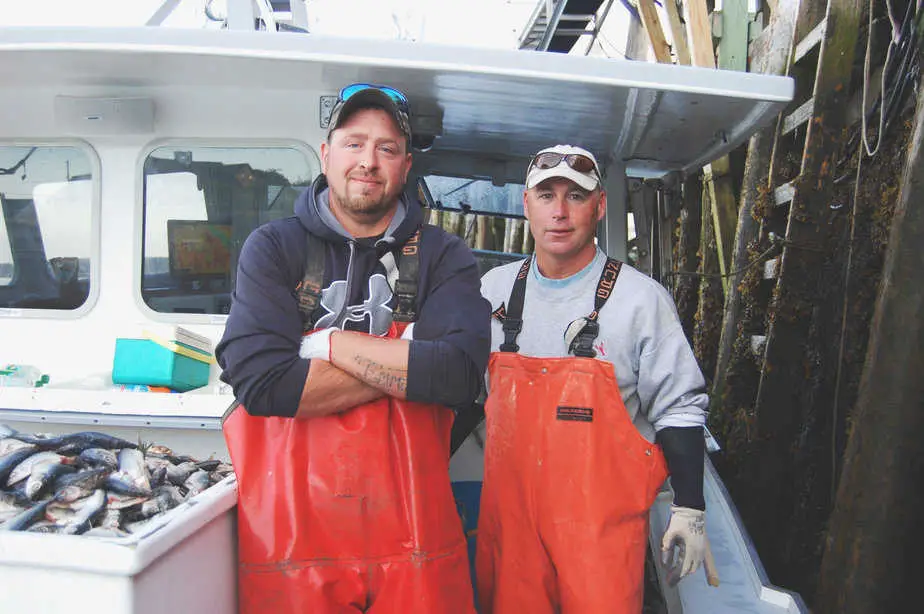BC: Tell us about how Luke’s came to be? How long was this project in the works before it came to fruition? What were some core tenets you wanted to drive the business from the start?
Ben Conniff: My business partner grew up in Maine and was a lobster man. Luke started out lobstering in high school, then went into finance after college. While working in New York, he realized he couldn’t find a good lobster roll in all of the city. He missed that high quality, affordable, honest lobster roll of Maine, so he put together a business model while working with his dad’s connections. This was back in 2009 when the economy had tanked, and demand for this this type of business was low. Luke wanted to increase demand and make it more accessible and sustainable. Maine and Canada lobster fisheries are some of most sustainable in the world. While keeping his day job, Luke put an ad out on craigslist.
I was looking for a food job–I’d been in editorial, freelance writing, focusing on food previously. I found the post and responded as a long shot. We met up in mid August of 2009. Immediately after, we found a location and signed a lease by October. We did not do things the conventional way, we had a shoestring budget, but our business model worked because of its simplicity. There was no cooking on site, all the lobster was cooked right off the docks in Maine. People quickly started realizing how meat holds quality better because the lobster has not been out of its habitat for days.
BC: How have you strategically chosen the international markets of Japan and Taiwan?
Ben Conniff: These countries sought out Luke’s because they were such fans. We waited for the right country before committing to this move. As Japan is the pinnacle of high quality seafood, it made sense. We were able to bring our product over. Bay Crews, our partnership company overseas, is scrupulous and diligent about portraying their brand. We also brought the product to Taiwan via the same company.
BC: As you grow, how are you able to sustain the quality and control of the lobster you’re fishing?
Ben Conniff: We’ve been able to increase the quality of the product as we’ve gotten bigger. We built our own state-of-the-art seafood company in Maine. We control every step of the process– size grade, cook by size in a state-of-the-art steamer, then chill immediately. The lobsters are Luke’s from fishing to sale, unlike most seafood companies. The better we do, the more we get to reinvest in the company all over again. Over time, our product improves in quality and has more quality control. In this way, we’re a unique company that improves with scale and supports the industry in the proper way. The money goes into the hands of the individual lobstermen rather than the middleman.
BC: What would you say is the most critical aspect of maintaining the integrity of the business?
Ben Conniff: What’s critical is knowing what fishery you’re working with, and the health and sustainable status of your fishery. You need that connection so you can directly examine the individual fishery. Maine lobster fisheries have extremely tight regulations. They have both minimum and maximum size regulation in regards to lobsters, ensuring healthy conditions and no risk of overfishing. Luke’s can know we are getting the best lobster, as well as keeping the population strong over time. Overall, this has been an amazing success story for sustainability in the lobster industry.
BC: How do you strategically plan where your next location will be? Has SF been in your sights for a while?
Ben Conniff: We’re always keeping an eye out for the next city. San Francisco has been on the radar for a long time, over four or five years. We had a lot to consider; what’s the right neighborhood? How can we best appeal to this city? Compared to any other city right now, San Francisco has a love of seafood and a committed interest in sustainability. We’re a certified B Corporation® because of our sustainability and because we treat our fisherman and team and stakeholders well; we support the oceans and coastal economies. San Francisco listens to stories like that more than any other market I can think of. That felt like a great fit for us.
BC: Similarly, tell us about how you came to work with Black Hammer as a pop-up.
Ben Conniff: We had a really strong response to local San Francisco companies wanting to partner with us. Black Hammer created a limited-run kelp beer using lobster shells from Luke’s and west coast kelp. Other local companies that have expressed support and interest of Luke’s are Fort Point, Souvla, Slanted Door, Tartine Bakery, Marine Layer, and Everlane. It’s been such a warm welcome and such guidance from like-minded businesses.
Luke’s San Francisco storefront, located in SoMa, just may be the coolest spot in the neighborhood. A pre-earthquake building on 92 Second Street, revels in its previous glory while bringing back some of that long-gone Barbary Coast feel. Doors open this month.
// Luke’s Lobster, 92 Second Street, SoMa; Read more on Luke’s website

